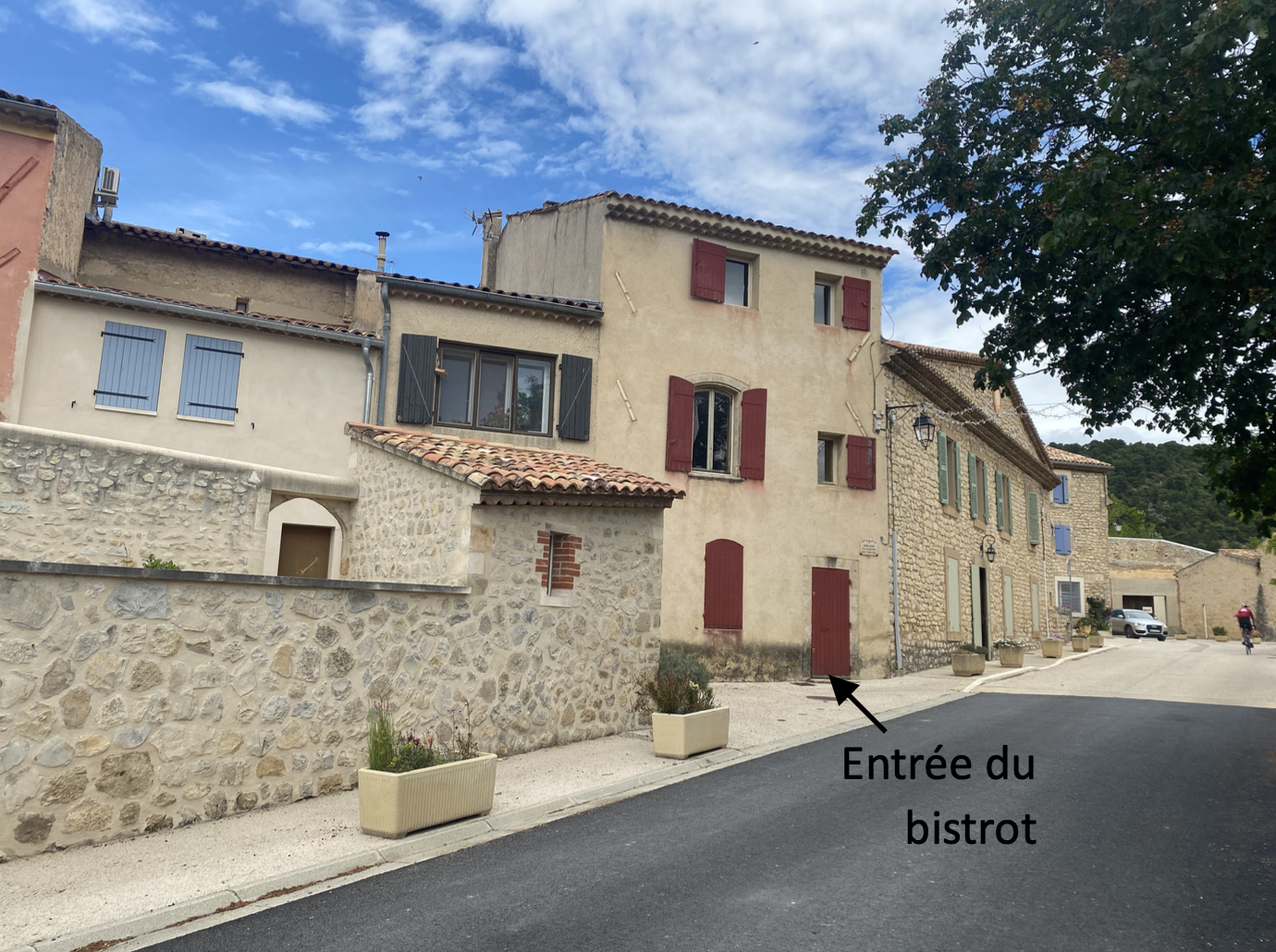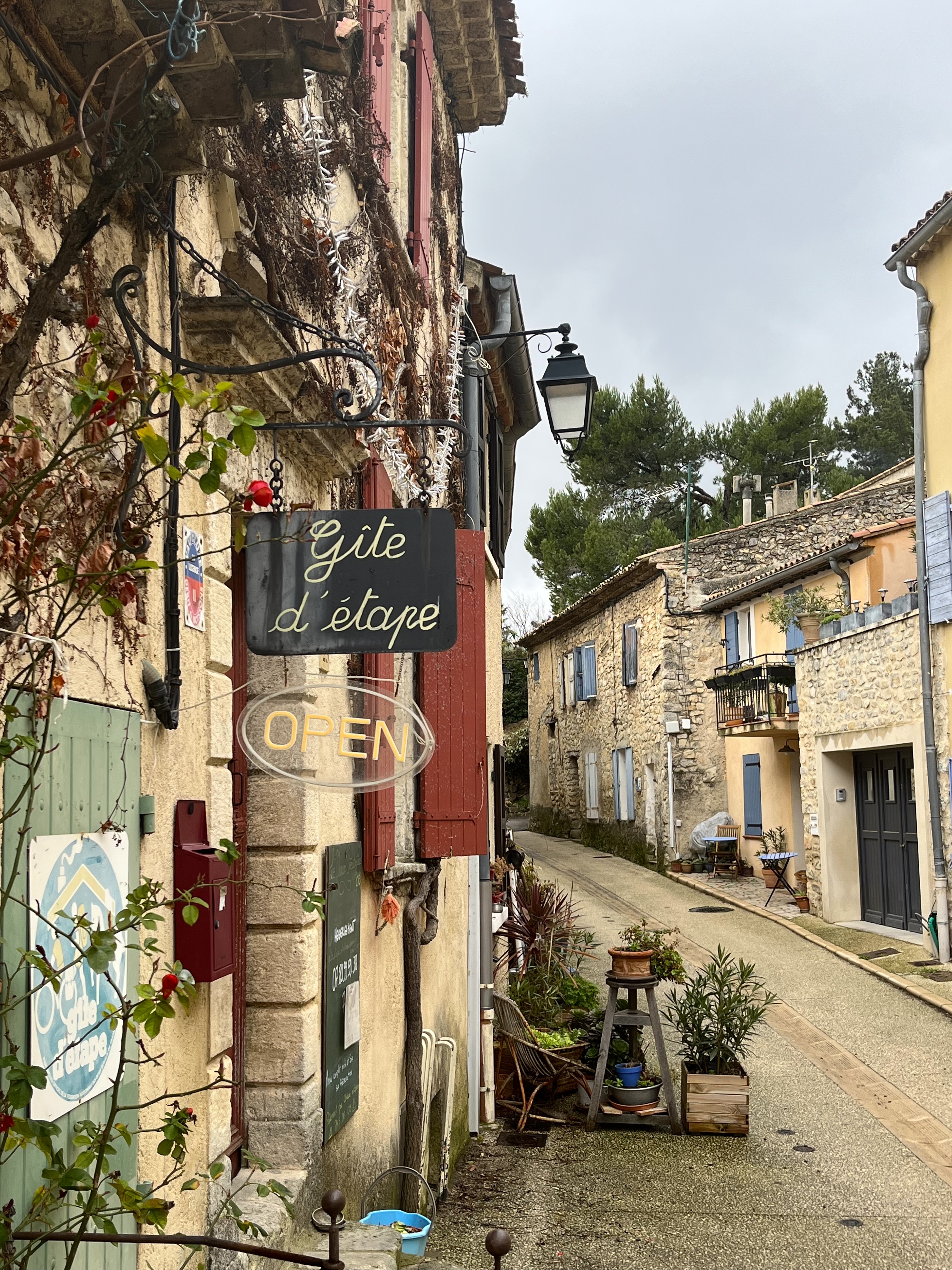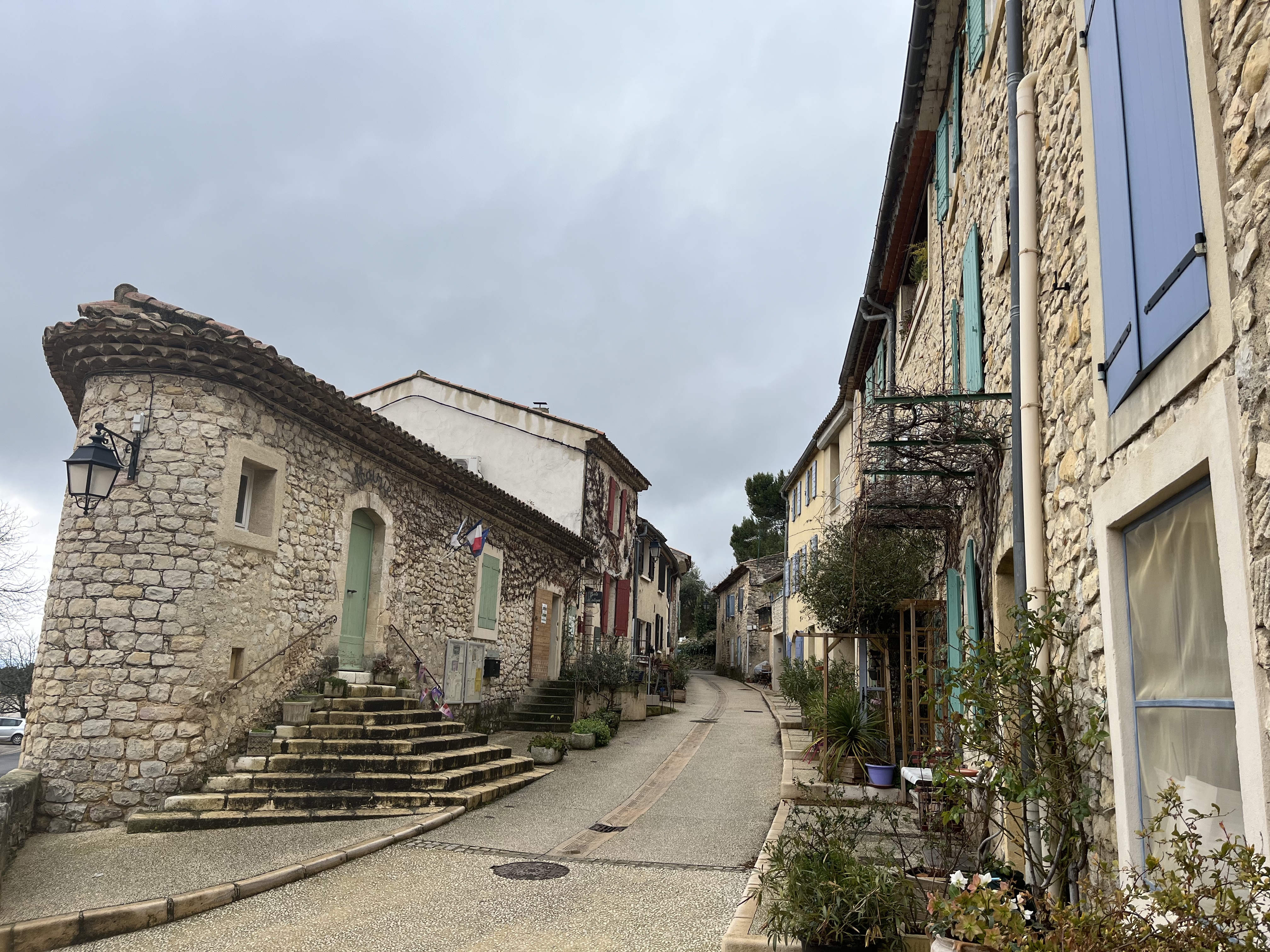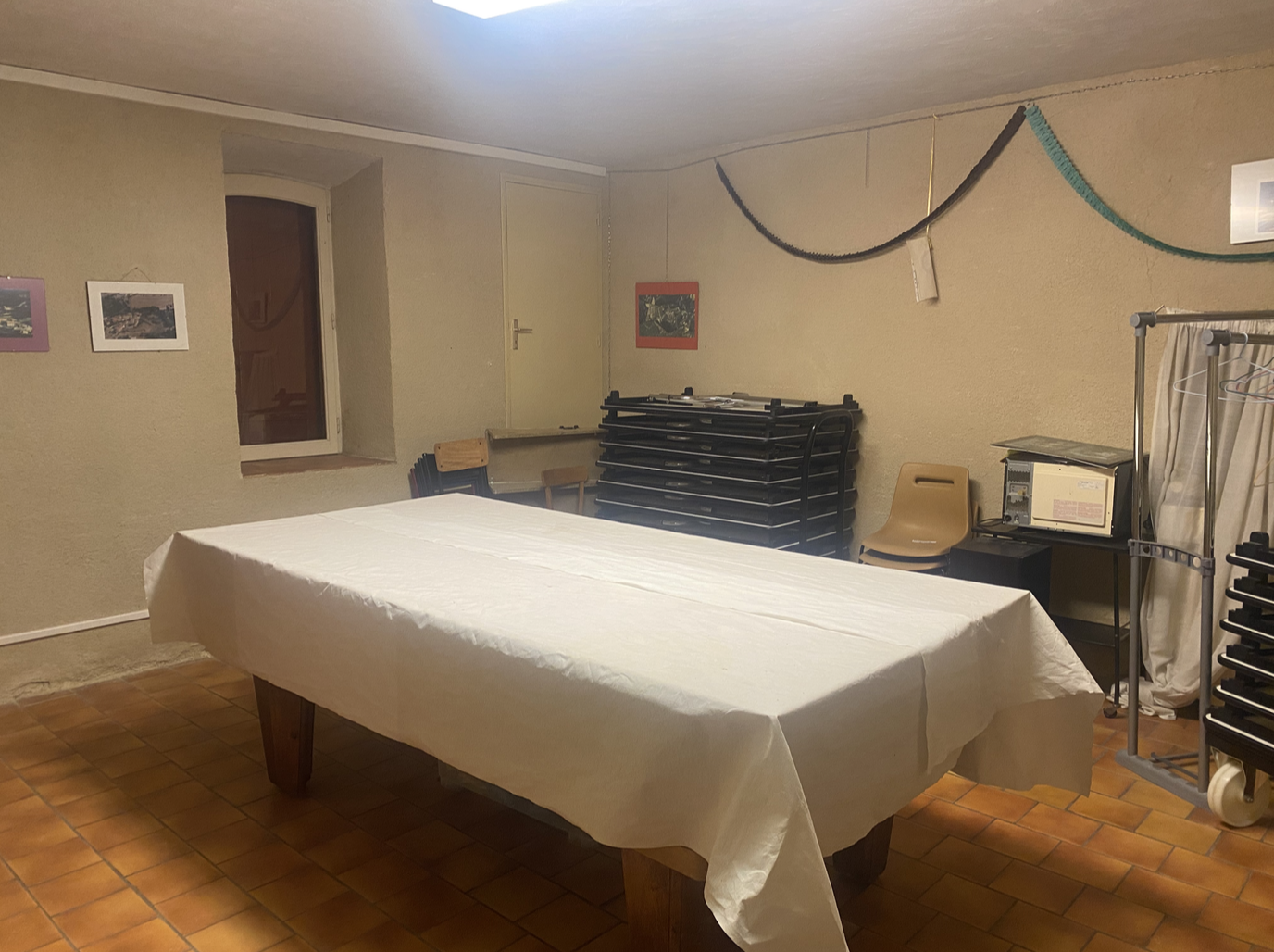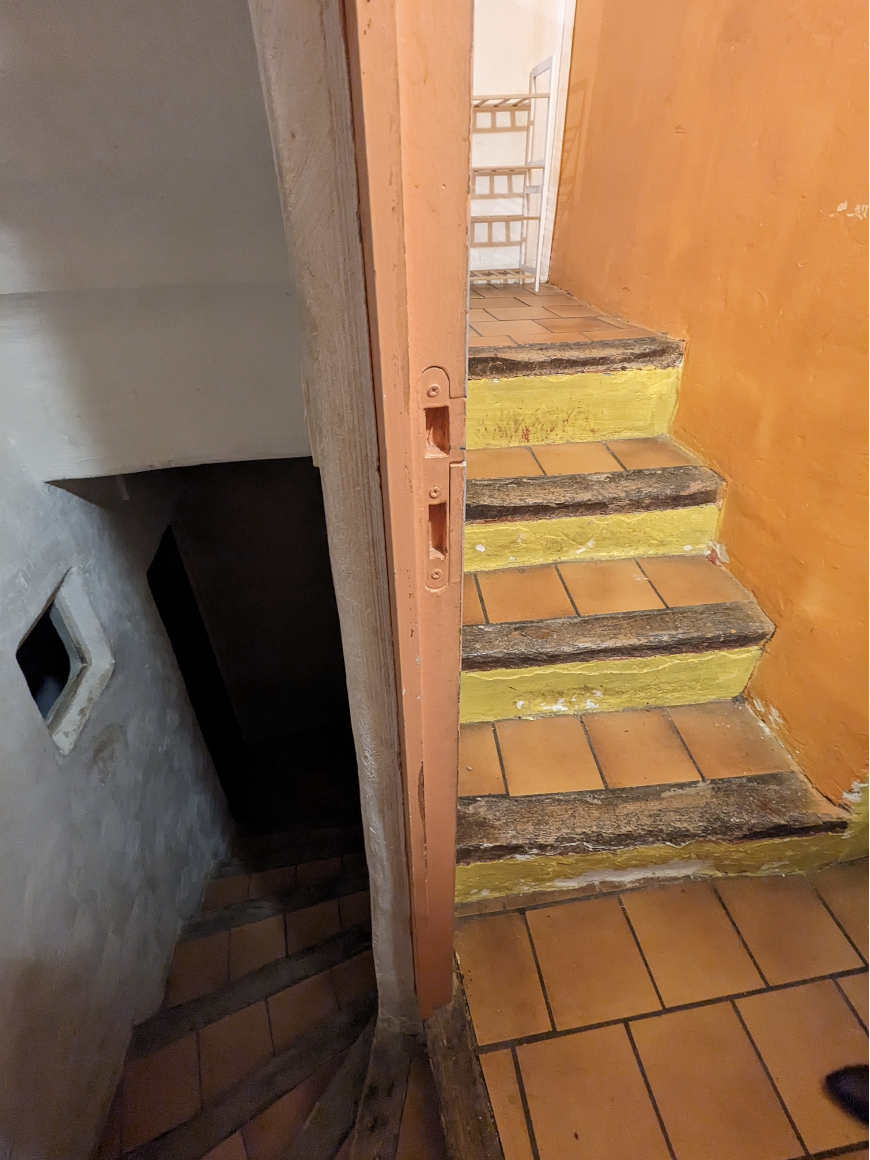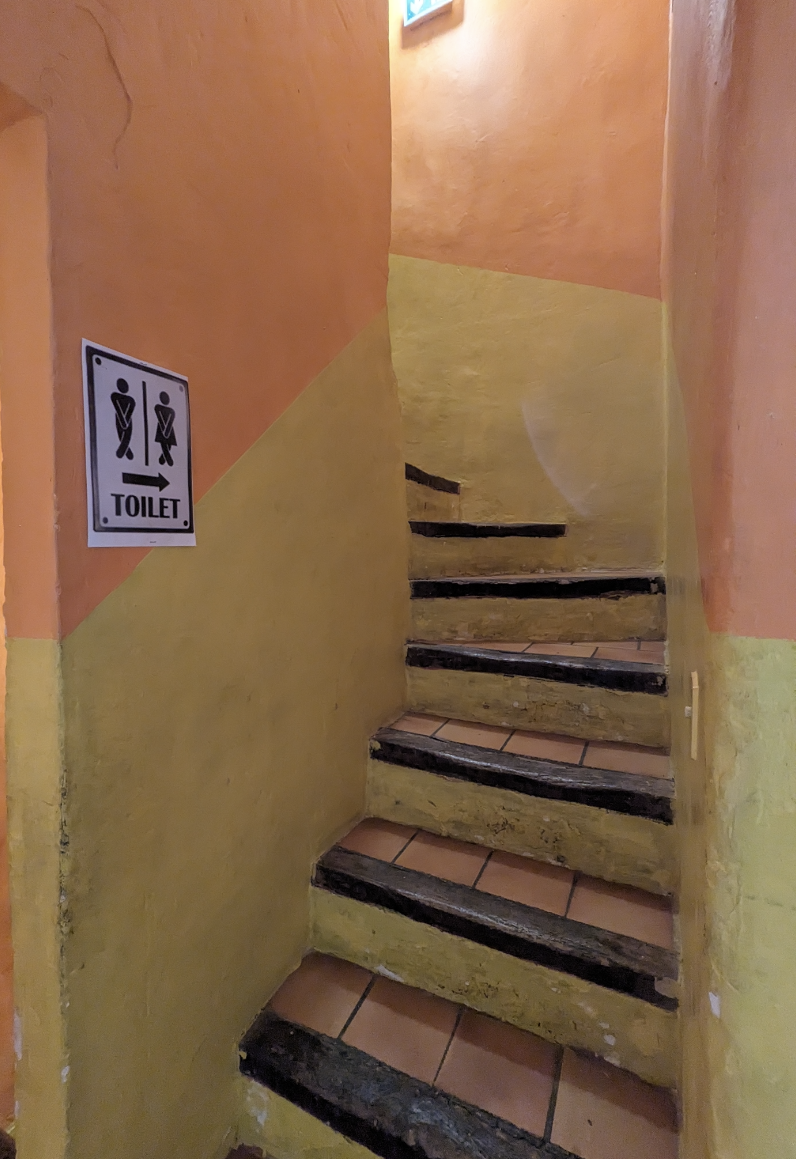rural hostel-bistro restoration
rural hostel-eatery
Located at an altitude of 627 meters in the heart of a mountainous ridge, Vitrolles-en-Luberon is the highest village in the southern Luberon. This village of 202 residents is committed to preserving its only rural business: a hostel-bistro.
The bistro is at the heart of local life—more than just a business, it serves as a place for social interaction, essential services, and community connection. This is why Vitrolles-en-Luberon aims to revitalize this iconic and unifying space, reinforcing i
The bistro is at the heart of local life—more than just a business, it serves as a place for social interaction, essential services, and community connection. This is why Vitrolles-en-Luberon aims to revitalize this iconic and unifying space, reinforcing i
France
25 rue de la mairie 84240 VITROLLES EN LUBERON
Prototype level
Yes
Yes
Yes
No
No
84151: Vitrolles-en-Lubéron (FR)
Nestled in the heart of the Luberon range, Vitrolles-en-Luberon is a well-preserved village at the foothills, committed to developing sustainable tourism and outdoor activities. Situated at the crossroads of several long-distance hiking trails (GR) and cycling routes, the municipality aims to offer a family-friendly hostel with fast locally sourced dhosteling opitions, quick, and locally sourced dining options.
As the only commercial establishment in the area, the hostel will introduce new services, including a bread depot, restaurant, coffee terrace, dormitory, and an outdoor terrace. The goal is to create a welcoming and social space for both residents and visitors, including hikers and tourists. The municipality also seeks to integrate the hostel into the "Bistrots de Pays de France" network, following its official charter.
The hostel is housed in an old four-story village center building, which is adjoinning and has limited space. The municipality must demonstrate ingenuity to enhance comfort and renovate the currently outdated spaces. The project also aims to address ecological challenges through an hostelovative and voluntary approach to renovating an old building, located within a Historic Monuments protection zone, while obtaining the Mediterranean Sustainable Building certification. The expected outcome is to achieve a balanced and environmentally respectful renovation that preserves the authentic Provençal character of the site.
Space requirements are divided into three main areas, according to the building’s levels and half-levels:
• Bistrot de Pays – 25m²
• Kitchen – 22m²
• Common room – 23m²
• Bedroom 1 – 21m²
• Bedroom 2 – 17m²
• Bedroom 3 – 20m²
• Shower rooms / Sanitary facilities – 17m²
• Terrace – 70m²
As the only commercial establishment in the area, the hostel will introduce new services, including a bread depot, restaurant, coffee terrace, dormitory, and an outdoor terrace. The goal is to create a welcoming and social space for both residents and visitors, including hikers and tourists. The municipality also seeks to integrate the hostel into the "Bistrots de Pays de France" network, following its official charter.
The hostel is housed in an old four-story village center building, which is adjoinning and has limited space. The municipality must demonstrate ingenuity to enhance comfort and renovate the currently outdated spaces. The project also aims to address ecological challenges through an hostelovative and voluntary approach to renovating an old building, located within a Historic Monuments protection zone, while obtaining the Mediterranean Sustainable Building certification. The expected outcome is to achieve a balanced and environmentally respectful renovation that preserves the authentic Provençal character of the site.
Space requirements are divided into three main areas, according to the building’s levels and half-levels:
• Bistrot de Pays – 25m²
• Kitchen – 22m²
• Common room – 23m²
• Bedroom 1 – 21m²
• Bedroom 2 – 17m²
• Bedroom 3 – 20m²
• Shower rooms / Sanitary facilities – 17m²
• Terrace – 70m²
- Energy efficiency
- Rural attractiveness
- preservation of local architecture
- heritage and tomorrow's challenges
- place to live
The renovation project aims to be sustainable, with certification under the Mediterranean Sustainable Building label.
The hostel is located in an old house in the village center, a four-story adjoining building with narrow spaces. The municipality must demonstrate ingenuity to improve comfort and refresh the currently outdated areas.
The project includes:
• Reconfiguring the hostel, with 15 beds distributed across the first and second floors.
• Creating a "Bistrot de Pays" dining space on the ground floor.
The main objectives are:
General building renovation:
• Roof replacement and insulation
• Installation of a heat pump and heating units
• Replacement of all exterior joinery
• Fireproofing of the staircase
• Electrical compliance upgrades
Bistro on the ground floor:
• Creation of a kitchen and a dining area for 50 guests
• Improved visibility from the exterior
• Opening the activity to public space with a terrace layout
Accommodations on the first floor:
• Creation of bedrooms and sanitary facilities
Dormitories and common room:
• Interior painting
Basement:
• Cleaning and maintenance
• Kitchen equipment installation
The hostel is located in an old house in the village center, a four-story adjoining building with narrow spaces. The municipality must demonstrate ingenuity to improve comfort and refresh the currently outdated areas.
The project includes:
• Reconfiguring the hostel, with 15 beds distributed across the first and second floors.
• Creating a "Bistrot de Pays" dining space on the ground floor.
The main objectives are:
General building renovation:
• Roof replacement and insulation
• Installation of a heat pump and heating units
• Replacement of all exterior joinery
• Fireproofing of the staircase
• Electrical compliance upgrades
Bistro on the ground floor:
• Creation of a kitchen and a dining area for 50 guests
• Improved visibility from the exterior
• Opening the activity to public space with a terrace layout
Accommodations on the first floor:
• Creation of bedrooms and sanitary facilities
Dormitories and common room:
• Interior painting
Basement:
• Cleaning and maintenance
• Kitchen equipment installation
Keywords for this renovation: aesthetic, high-quality, local, Provençal, heritage, picturesque.
The project is located in an old house on the village’s only street. Therefore, the rehabilitation must integrate seamlessly with the architectural quality of the village while respecting its Provençal identity. Moreover, the project is within the protection perimeter of France’s Historic Monuments for the château. It must receive approval from the French Heritage Architects.
This is an aesthetic and high-quality renovation of the building, its façade, and interior spaces, including custom-made beds, new furniture, and kitchen upgrades. The rehabilitation should contribute to the vibrancy and beautification of the village’s public spaces.
For this reason, the project includes the creation of a landscaped terrace (with a trellis), featuring elegant furniture and a children’s play area. The renovation will use noble, locally sourced materials in strict accordance with the Local Urban Plan for the protected Historic Monuments zone.
Aesthetics play a key role in the attractiveness of our rural villages, enhancing their image and reinforcing the quality of Provençal heritage.
The project is located in an old house on the village’s only street. Therefore, the rehabilitation must integrate seamlessly with the architectural quality of the village while respecting its Provençal identity. Moreover, the project is within the protection perimeter of France’s Historic Monuments for the château. It must receive approval from the French Heritage Architects.
This is an aesthetic and high-quality renovation of the building, its façade, and interior spaces, including custom-made beds, new furniture, and kitchen upgrades. The rehabilitation should contribute to the vibrancy and beautification of the village’s public spaces.
For this reason, the project includes the creation of a landscaped terrace (with a trellis), featuring elegant furniture and a children’s play area. The renovation will use noble, locally sourced materials in strict accordance with the Local Urban Plan for the protected Historic Monuments zone.
Aesthetics play a key role in the attractiveness of our rural villages, enhancing their image and reinforcing the quality of Provençal heritage.
The municipality wishes to retain the management of the hostel to ensure a lively space that meets public expectations in terms of furniture quality, opening hours, and community events. The idea is for the municipality to remain in charge so that the venue remains open to any proposals from residents.
To achieve this, the municipality will launch a call for applications to recruit a manager responsible for overseeing the site while ensuring its vibrancy. The selected manager will uphold the commune’s image and its spirit of hospitality.
For the bistro to thrive, residents must take an active role in shaping the space, contributing ideas for events such as Halloween celebrations, bingo nights, and Christmas festivities.
A public meeting will be held to present the project to residents. An official inauguration will be organized, and the South Luberon Tourist Office will help promote the venue.
The site will be listed as a stopover point on long-distance hiking trails (GR), cycling routes, and within the “Bistrots de Pays” network.
To achieve this, the municipality will launch a call for applications to recruit a manager responsible for overseeing the site while ensuring its vibrancy. The selected manager will uphold the commune’s image and its spirit of hospitality.
For the bistro to thrive, residents must take an active role in shaping the space, contributing ideas for events such as Halloween celebrations, bingo nights, and Christmas festivities.
A public meeting will be held to present the project to residents. An official inauguration will be organized, and the South Luberon Tourist Office will help promote the venue.
The site will be listed as a stopover point on long-distance hiking trails (GR), cycling routes, and within the “Bistrots de Pays” network.
In 2021, the Chamber of Commerce and Industry conducted a study on commercial revitalization. A survey was carried out among residents to assess their needs and the catchment area.
Today, the project is in its final preliminary design phase but has not yet undergone extensive public inclusion. However, the municipality has informed residents through public meetings held during festive events. Additional public meetings are planned.
The goal is to ensure continuous community involvement throughout the life of the "Bistrot de Pays" / hostel. The municipality aims to create a warm, unifying space where local residents, hikers, mountain bikers, and tourists can gather. At the village level, the objective is to provide an intergenerational and family-friendly meeting place where people can relax, enjoy a local dish, and share a drink.
The municipality will manage the venue and organize various events, including festivities, concerts, village activities, and art and cultural exhibitions.
A suggestion box may be introduced to encourage residents to actively participate in shaping this village hub.
In addition to the hostel, the space will serve as a multi-service hub and resource center, offering essential services within a 10-minute drive, such as:
• Bread depot
• Sale of essential dry local products
• Tourist information point
• Parcel drop-off and collection service
Today, the project is in its final preliminary design phase but has not yet undergone extensive public inclusion. However, the municipality has informed residents through public meetings held during festive events. Additional public meetings are planned.
The goal is to ensure continuous community involvement throughout the life of the "Bistrot de Pays" / hostel. The municipality aims to create a warm, unifying space where local residents, hikers, mountain bikers, and tourists can gather. At the village level, the objective is to provide an intergenerational and family-friendly meeting place where people can relax, enjoy a local dish, and share a drink.
The municipality will manage the venue and organize various events, including festivities, concerts, village activities, and art and cultural exhibitions.
A suggestion box may be introduced to encourage residents to actively participate in shaping this village hub.
In addition to the hostel, the space will serve as a multi-service hub and resource center, offering essential services within a 10-minute drive, such as:
• Bread depot
• Sale of essential dry local products
• Tourist information point
• Parcel drop-off and collection service
In 2021, the Chamber of Commerce and Industry conducted a study on commercial revitalization. A survey was carried out among residents to assess the needs of the territory.
In January 2022, the Council for Architecture, Urban Planning, and the Environment conducted a feasibility study for the energy rehabilitation of the stage lodging and the development of stopover points to strengthen existing activities.
Since October 2023, Vitrolles-en-Luberon has been supported by an administrative consultant and has appointed an architect and a technical agency for the Mediterranean Sustainable Building label certification. Local officials also met with the Director of the French Federation of "Bistrots de Pays" to ensure compliance with selection criteria.
Finally, the project must be approved by the Architects of the Buildings of France, as it is within the protected area of the classified historic Château.
The municipality has received financial support from:
• The State, through the rural territories support grant
• The Region, under the "Nos communes d’abord" (« Our communities fast ») program
• A State call for projects aimed at maintaining the last commercial establishment in rural areas
• A call for projects from the National Agency for Territorial Cohesion to create a social gathering place in a rural setting.
In January 2022, the Council for Architecture, Urban Planning, and the Environment conducted a feasibility study for the energy rehabilitation of the stage lodging and the development of stopover points to strengthen existing activities.
Since October 2023, Vitrolles-en-Luberon has been supported by an administrative consultant and has appointed an architect and a technical agency for the Mediterranean Sustainable Building label certification. Local officials also met with the Director of the French Federation of "Bistrots de Pays" to ensure compliance with selection criteria.
Finally, the project must be approved by the Architects of the Buildings of France, as it is within the protected area of the classified historic Château.
The municipality has received financial support from:
• The State, through the rural territories support grant
• The Region, under the "Nos communes d’abord" (« Our communities fast ») program
• A State call for projects aimed at maintaining the last commercial establishment in rural areas
• A call for projects from the National Agency for Territorial Cohesion to create a social gathering place in a rural setting.
Since November 26, 2024, Vitrolles-en-Luberon has been engaged in the Territorial Revitalization Operation (ORT) to demonstrate the commitment of small rural municipalities to territorial development. The ORT is a partnership agreement signed between the State, the Department, the intermunicipal community (COTELUB), and voluntary municipalities to revitalize their town centers.
To join this ORT, the municipality must conduct a comprehensive diagnostic assessment and develop an overall planning program for the commune. Projects must align with a coherent strategy at both the municipal and intermunicipal levels, covering various aspects such as mobility, housing, commerce, heritage, and public spaces.
The rehabilitation project of the hostel meets all the criteria and contributes to the revitalization of the area while serving as an exemplary initiative.
As part of the ORT, the project's progress is reviewed by a steering committee with all partners at least once a year, including representatives from the State, the Region, the Department of Vaucluse, COTELUB, the Luberon Regional Natural Park, the urban planning agency, the territorial bank, and the National Housing Agency.
To join this ORT, the municipality must conduct a comprehensive diagnostic assessment and develop an overall planning program for the commune. Projects must align with a coherent strategy at both the municipal and intermunicipal levels, covering various aspects such as mobility, housing, commerce, heritage, and public spaces.
The rehabilitation project of the hostel meets all the criteria and contributes to the revitalization of the area while serving as an exemplary initiative.
As part of the ORT, the project's progress is reviewed by a steering committee with all partners at least once a year, including representatives from the State, the Region, the Department of Vaucluse, COTELUB, the Luberon Regional Natural Park, the urban planning agency, the territorial bank, and the National Housing Agency.
The Mediterranean Sustainable Building label is generally awarded to new buildings. In the era of zero net land artificialization, it is crucial for municipalities to undertake projects within existing buildings. Moreover, given regulatory standards (accessibility, hygiene, safety, storage), it is challenging to carry out such projects in old buildings, especially when their use changes. Leading by example means creating something new within the old, proving that it is possible.
Additionally, energy efficiency is often seen as conflicting with the preservation of architectural heritage. The protection perimeter of Historic Monuments imposes strict regulations, such as the prohibition of installing photovoltaic panels, enlarging openings for more natural light, adding a rooftop terrace for comfort, or installing heat pumps due to the outdoor air conditioning unit on the façade.
When solutions are found, the required adaptations entail additional costs that small municipalities cannot afford (e.g., wooden shutters, heating systems). This is why the Vitrolles-en-Luberon project is supported at the national level as an example of best practices and as a subject for reflection and regulatory evolution.
Additionally, energy efficiency is often seen as conflicting with the preservation of architectural heritage. The protection perimeter of Historic Monuments imposes strict regulations, such as the prohibition of installing photovoltaic panels, enlarging openings for more natural light, adding a rooftop terrace for comfort, or installing heat pumps due to the outdoor air conditioning unit on the façade.
When solutions are found, the required adaptations entail additional costs that small municipalities cannot afford (e.g., wooden shutters, heating systems). This is why the Vitrolles-en-Luberon project is supported at the national level as an example of best practices and as a subject for reflection and regulatory evolution.
The municipality has gathered together with numerous competent consulting firms in various fields:
• Architect with expertise in heritage
• Energy consulting firm
• Structural engineering firm
• Consulting firm specializing in sustainable buildings
These various areas of expertise allowed for diagnostics to be conducted and scenarios for rehabilitation to be proposed. These scenarios were reinforced by dynamic thermal simulations.
The final draft project was communicated to the architects of the French Buildings Department for approval and validation. Furthermore, the project was presented to the key stakeholders, including the French Federation of Country Bistros or the State.
The project has been included in the « Territorial Revitalization Operation » agreement , overseen by the National Agency for Territorial Cohesion (State), the Vaucluse Department, and the COTELUB Community of Communes.
The municipality is being supported by advisory engineering services.
For the recruitment of a manager, the municipality will remain responsible for the proper functioning of the premises. It will work with the Chamber of Industry and Commerce to issue a call for candidates that meets the needs of village life and its residents. A survey and a public meeting will be organized in this regard this year. The residents will be involved in the project once it is launched.
• Architect with expertise in heritage
• Energy consulting firm
• Structural engineering firm
• Consulting firm specializing in sustainable buildings
These various areas of expertise allowed for diagnostics to be conducted and scenarios for rehabilitation to be proposed. These scenarios were reinforced by dynamic thermal simulations.
The final draft project was communicated to the architects of the French Buildings Department for approval and validation. Furthermore, the project was presented to the key stakeholders, including the French Federation of Country Bistros or the State.
The project has been included in the « Territorial Revitalization Operation » agreement , overseen by the National Agency for Territorial Cohesion (State), the Vaucluse Department, and the COTELUB Community of Communes.
The municipality is being supported by advisory engineering services.
For the recruitment of a manager, the municipality will remain responsible for the proper functioning of the premises. It will work with the Chamber of Industry and Commerce to issue a call for candidates that meets the needs of village life and its residents. A survey and a public meeting will be organized in this regard this year. The residents will be involved in the project once it is launched.
Despite their charm, buildings located in old town centers no longer meet society’s expectations: the spaces are too cramped, outdated, leading to a decline in the vitality of city centers. This phenomenon is observed both in housing and commerce, creating a snowball effect.
The Vitrolles project in Luberon is not hostelovative in terms of technology, but it is hostelovative in its ambition and approach. Indeed, there are currently few solutions for the rehabilitation of old town centers that combine the preservation of the old with energy renovation: for example, external insulation is often recommended.
The municipality has been supported throughout the project by numerous experts in their respective fields to find solutions. However, the working methodology could go further with larger-scale working and thinking groups to relax regulations and promote hostelovation permits. From this working group, tool sheets could be written and serve municipalities wishing to take on this challenge.
Moreover, the financial overcosts associated with the BDM label have not helped the small municipality, which spent a long time focusing on how to finance its project. Financial aid should support small municipalities and this type of exemplary project.
The Vitrolles project in Luberon is not hostelovative in terms of technology, but it is hostelovative in its ambition and approach. Indeed, there are currently few solutions for the rehabilitation of old town centers that combine the preservation of the old with energy renovation: for example, external insulation is often recommended.
The municipality has been supported throughout the project by numerous experts in their respective fields to find solutions. However, the working methodology could go further with larger-scale working and thinking groups to relax regulations and promote hostelovation permits. From this working group, tool sheets could be written and serve municipalities wishing to take on this challenge.
Moreover, the financial overcosts associated with the BDM label have not helped the small municipality, which spent a long time focusing on how to finance its project. Financial aid should support small municipalities and this type of exemplary project.
How can buildings in old town centers meet today’s and tomorrow’s challenges (environmental, sociological, technological, user comfort)?
How can we create a sustainable (or energy-positive) building while preserving the charm of the old? How can we combine preservation and rehabilitation?
Create working groups around heritage restoration, a marker of landscape and architectural identity.
Vitrolles in Luberon is an example of a village's resilience in maintaining the last commercial activity, housing, and life in the old village center. It represents the archetype of the Provencal village but also any type of village on a larger scale.
The rural world is the guarantor of a better quality of life today and in the future.
How can we create a sustainable (or energy-positive) building while preserving the charm of the old? How can we combine preservation and rehabilitation?
Create working groups around heritage restoration, a marker of landscape and architectural identity.
Vitrolles in Luberon is an example of a village's resilience in maintaining the last commercial activity, housing, and life in the old village center. It represents the archetype of the Provencal village but also any type of village on a larger scale.
The rural world is the guarantor of a better quality of life today and in the future.
Located in the foothill of the Luberon range, the commune of Vitrolles-en-Luberon is a protected village, committed to developing sustainable tourism and outdoor activities. Since November 26, 2024, Vitrolles has been engaged in the Territorial Revitalization Operation, demonstrating the commitment of small rural municipalities to regional development.
Developing Sustainable Tourism
The project aligns with the territory’s tourism development plan, which aims to promote sustainable tourism and outdoor activities. Situated at the crossroads of several hiking trails (GR) and cycling routes, the commune seeks to offer affordable accommodation and family-friendly, fast dining options.
Enhancing Local Attractiveness
The hostel is the only business in the area. More than just an economic activity, the commune aims to create a genuine place for social interaction and community engagement, catering to both residents and visitors, including hikers and tourists.
Energy Challenges
The renovation project aims to be environmentally responsible, with BDM (Bâtiment Durable Méditerranéen) certification. However, the hostel is housed in an old village-center building, featuring four levels, adjoining structures, and compact spaces. As a result, the project team—including the project owner (MOA), technical assistant (AMO), and project manager (MOE)—must demonstrate determination and creativity to adhere to the BDM charter. The primary goal of the renovation is to enhance comfort and modernize the outdated spaces.
Developing Sustainable Tourism
The project aligns with the territory’s tourism development plan, which aims to promote sustainable tourism and outdoor activities. Situated at the crossroads of several hiking trails (GR) and cycling routes, the commune seeks to offer affordable accommodation and family-friendly, fast dining options.
Enhancing Local Attractiveness
The hostel is the only business in the area. More than just an economic activity, the commune aims to create a genuine place for social interaction and community engagement, catering to both residents and visitors, including hikers and tourists.
Energy Challenges
The renovation project aims to be environmentally responsible, with BDM (Bâtiment Durable Méditerranéen) certification. However, the hostel is housed in an old village-center building, featuring four levels, adjoining structures, and compact spaces. As a result, the project team—including the project owner (MOA), technical assistant (AMO), and project manager (MOE)—must demonstrate determination and creativity to adhere to the BDM charter. The primary goal of the renovation is to enhance comfort and modernize the outdated spaces.

